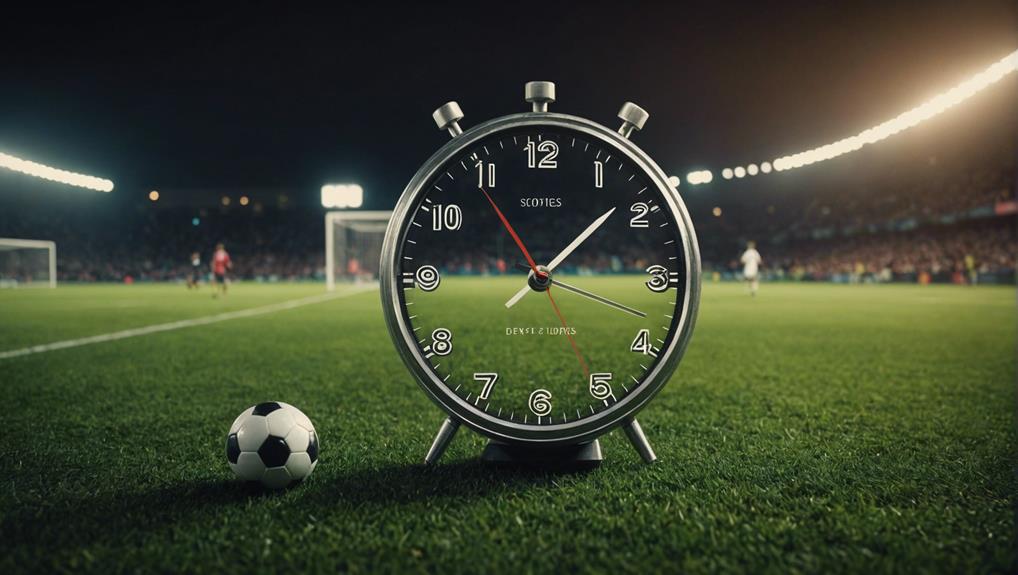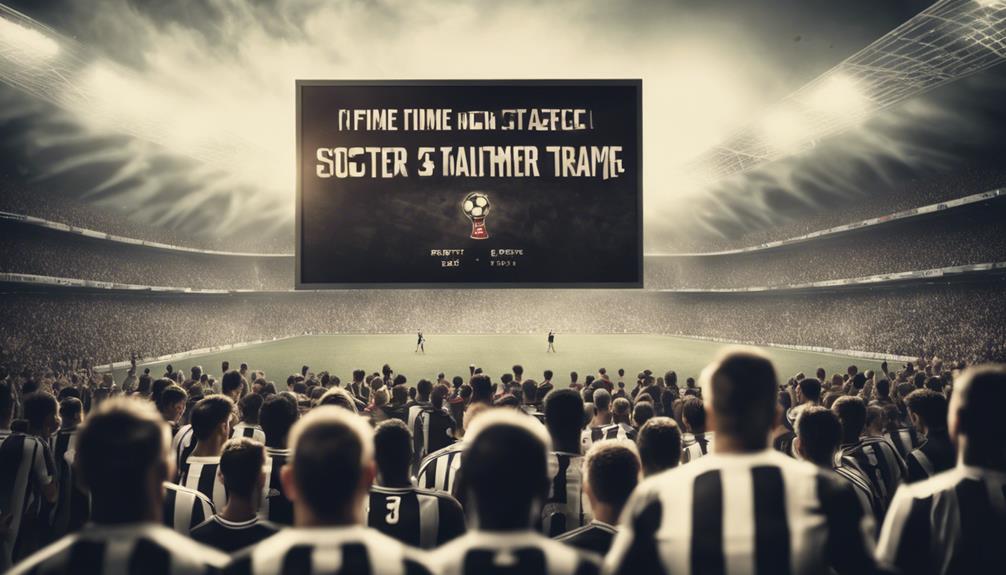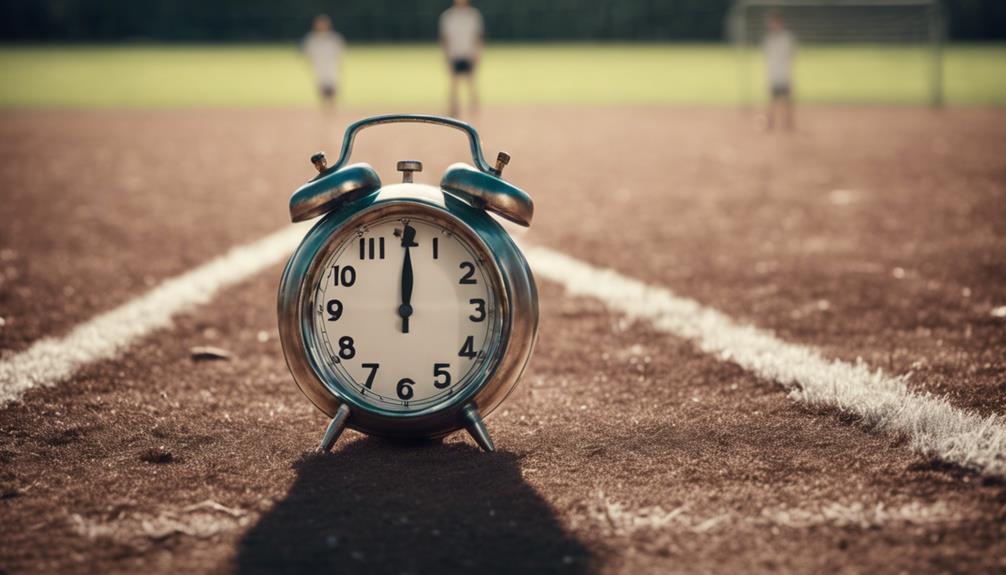
The Ultimate Guide to How Long a Soccer Match Is
April 26, 2024If you're curious about a soccer match's duration, it lasts a total of 90 minutes. Split into two 45-minute halves, this standard game is filled with excitement. The match might go beyond 90 minutes due to stoppage time for delays. You'll discover more aspects about soccer game lengths and rules if you explore further.
Standard Duration of a Soccer Match
In a soccer match, the standard duration consists of two halves, each lasting 45 minutes. This regulation time is essential in all soccer games, providing a structured framework for play. It guarantees fairness and consistency across different levels of competition, from local matches to international tournaments. The 45 minutes per half are vital for teams to showcase their skills, tactics, and endurance on the field.
While the standard match duration is 90 minutes, stoppage time or added time may extend the game. This extra time accommodates delays that occur during play, such as injuries, substitutions, or time-wasting tactics. However, the core of a soccer match remains the two 45-minute halves that test the players' abilities and the team's strategies.
Halftime, lasting up to 15 minutes, allows players to rest, rehydrate, and receive instructions from their coaches before heading back onto the field for the second half. This structured format ensures that soccer matches maintain a consistent and fair playing time for all involved.
Halftime Break in Soccer
During halftime in soccer, players utilize the break to rest, hydrate, receive coaching, and adjust tactics to prepare for the second half. This brief interval, lasting a maximum of 15 minutes, is vital for players to recover both mentally and physically. It offers a moment of respite from the intense physical demands of the game, allowing them to recharge and refocus for the remainder of the match.
Coaches often take this opportunity to provide strategic guidance, making tactical adjustments that can sway the course of the game. Additionally, halftime presents a chance for teams to regroup collectively, fostering a sense of unity and shared purpose.
Substitutions may also take place during this break, enabling teams to inject fresh energy and alter their playing style. Ultimately, the halftime break in soccer isn't just a pause in the action but a pivotal moment where teams can recalibrate, strategize, and come back onto the field revitalized and ready to compete.
Stoppage Time Explanation

When it comes to stoppage time in soccer, understanding its purpose is crucial.
Referees manage the time by adding minutes for various interruptions during the game.
This extra time guarantees fairness and compensates for any lost playing time.
Stoppage Time Purpose
Stoppage time in soccer serves a vital function by accommodating breaks in play and interruptions that occur throughout a match. Referees determine the amount of stoppage time added at the end of each half to guarantee fairness.
This additional time caters to various interruptions like injuries, substitutions, time-wasting tactics, VAR checks, and disciplinary actions. Typically, matches have an average of 2-5 minutes of stoppage time per half, although this can fluctuate depending on the events during the game.
Referee Time Management
To smoothly segue into discussing Referee Time Management, consider the importance of stoppage time in soccer matches. Referees add stoppage time at the end of each half to account for interruptions like injuries, substitutions, and VAR checks.
This added time typically ranges from 1 to 7 minutes per half, depending on the duration of delays during the game. The referee's discretion in determining added time ensures fair play and compensates for any lost time during the match.
Timekeeping errors in the first half can't be rectified in the second half, highlighting the significance of accurate stoppage time management. Ultimately, stoppage time and added time play a pivotal role in ensuring that the total duration of professional soccer games accurately reflects the actual playing time without interruptions.
Extra Time in Cup Competitions
In cup competitions, extra time offers a chance for teams to break a deadlock before heading into a penalty shootout. This added period not only increases the excitement but also tests the players' endurance and mental strength.
It becomes a critical phase where every move can determine the outcome of the match.
Cup Competition Overtime Rules
Cup competitions implement extra time, comprising two 15-minute halves, to determine a definitive winner following a draw in regulation time. This additional period aims to break the deadlock and prevent matches from ending in a draw.
The overtime rules provide both teams with an opportunity to secure a victory within the allocated 30 minutes. If the scores remain level after extra time, the match progresses to a penalty shootout to establish a clear winner.
Impact on Player Fatigue
Experiencing additional time in cup competitions can have a substantial impact on player fatigue levels, requiring heightened endurance and resilience. During extra time, players face an extra 30 minutes of intense gameplay, testing both their physical and mental endurance.
Managing fatigue becomes vital to sustain performance levels throughout extended matches. The pressure escalates further with the possibility of penalty shootouts following extra time, adding to the strain on fatigued players.
To excel in these situations, players mustn't only possess exceptional skills but also implement effective fatigue management strategies to cope with the demands of prolonged matches in cup competitions. The ability to endure and perform under such circumstances becomes a defining factor for success in these high-stakes games.
Penalty Shootout Rules

When engaging in a penalty shootout, a coin toss is used to determine which team will take the first penalty. Each team must have different players taking the penalties to guarantee fairness in the shootout.
The shootout rules typically involve each team taking five penalties. The winner is decided either after 10 penalties have been taken by each team or when one team has established an insurmountable lead that can't be matched by the opponent.
If the score is still tied after the initial 10 penalties, the shootout continues in a sudden-death format until a clear winner emerges. This format aims to provide a decisive outcome within a reasonable timeframe and adds an element of excitement for both players and fans.
Ultimately, the team that emerges victorious in the penalty shootout is declared the winner of the match.
Duration of Professional Matches
After understanding the rules and outcomes of penalty shootouts in soccer matches, let's now explore the duration of professional matches.
Professional soccer matches are known for their long playing time, lasting a total of 90 minutes. These 90 minutes are divided into two halves of 45 minutes each. However, the actual time played can be longer due to stoppage time. Referees have the authority to add stoppage time ranging from 1 to 7 minutes per half to make up for any interruptions that occur during the game.
In the case of a tie after the regulation 90 minutes, extra time comes into play. Extra time consists of two 15-minute halves without a break. If the teams are still level after extra time, the match proceeds to penalty shootouts. During all these phases, referees use their discretion to decide on added time based on various interruptions to ensure fairness in the game.
Length of Youth Soccer Games

Youth soccer games vary in duration depending on the age group, with younger players typically participating in shorter matches. For U6 and U8 age groups, games usually last between 20-30 minutes per game, allowing for shorter attention spans and ensuring player engagement.
As players progress to the U10 and U12 categories, match durations typically extend to 25-30 minutes per half, striking a balance between player development and safety. In the U14 age group, games are further lengthened to 35-40 minutes per half to accommodate the growing skills and physical capabilities of older youth players.
Tailoring the length of youth soccer games to specific age groups is vital for fostering skill advancement, maintaining player interest, and ensuring a safe playing environment for all participants. By adjusting game durations based on age, youth soccer programs can optimize the playing experience and support the holistic development of young athletes.
Conclusion
To sum up, as the famous adage goes, 'it ain't over till it's over.' So remember, a soccer match can be full of excitement, suspense, and unexpected twists until the final whistle blows.
From standard play time to stoppage time and beyond, the duration of a soccer match can vary.
So sit back, relax, and enjoy the thrill of the beautiful game until the very end.


